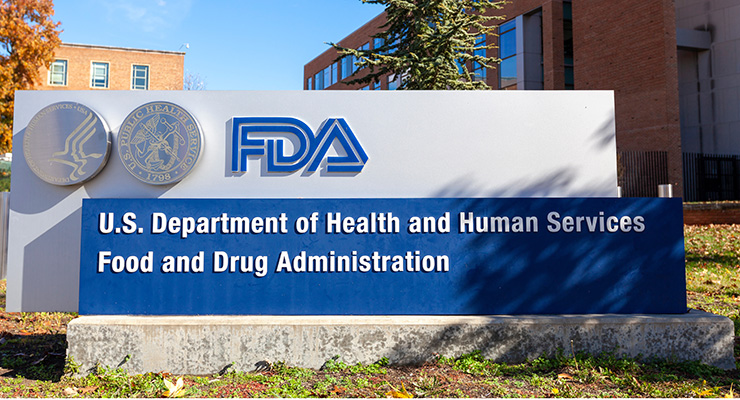By Mike Montemarano, Associate Editor04.28.23
FDA continues to prioritize efforts to modernize the Dietary Supplement Health and Education Act (DSHEA). Cara Welch, director of the Office of Dietary Supplement Programs (ODSP) at FDA addressed attendees at SupplySide East in April during a regulatory panel discussion.
The agency’s priorities include a continued push for mandatory product listing (MPL) of dietary supplements in its FY2024 budget proposal and New Dietary Ingredient Notification (NDIN) guidance (eventually). Trade association leadership and attorneys specializing in supplement regulation complemented the panel with their perspectives on these issues and more.
According to Megan Olsen, senior vice president and general counsel to the Council for Responsible Nutrition (CRN), MPL enactment could open up a pathway for favorable reforms to DSHEA and its enforcement.
Duffy MacKay, senior vice president of dietary supplements at the Consumer Healthcare Products Association (CHPA), noted that MPL has recently been enacted, albeit without public access, for the cosmetics industry through the Modernization of Cosmetics Regulation Act of 2022 (MoCRA).
The impression that cosmetics are a more regulated industry than dietary supplements could hinder the overall reputation of the industry, he argued.
MoCRA “provides a telegraph of what we should expect from DSHEA reform,” MacKay suggested. MPL will be necessary to secure trust from both the medical community and overseas stakeholders concerned about the lack of protection that comes with weak regulations, MacKay added.
“While the details of the product listing provision still have to be worked out as part of the rulemaking process, to be scared of the principal aspect of providing FDA with a product label makes absolutely no sense,” he said.
According to Kevin Bell, partner at Arnall Golden Gregory LLP, representing the Natural Products Association (NPA), which has been vocally opposed to MPL, the issues that FDA claims warrant MPL are better fixed through authorities already granted by DSHEA. He expressed little faith that MPL enactment would result in the agency creating a more positive narrative about dietary supplements than it has to date. “FDA treats this industry in a scurrilous way all the time .... Mandatory product listing is not going to get us anywhere,” he said.

These declarations, on cannabidiol (CBD), N-acetyl-cysteine (NAC), nicotinamide mononucleotide (NMN), and others have a significant impact on industry stakeholders.
Critics argue the agency shouldn’t be able to make such declarations, and effectively pull ingredients from the marketplace, with seemingly no warning, especially without clear direction on the NDIN process.
“Creating NDI guidance is our priority, and one of these days, it’s actually going to happen,” said Welch. “We’re working on becoming more transparent about the positions we’ve taken, and about the ingredients that we’ve acted on.”
CRN is developing a citizen petition covering its concerns about how this provision of DSHEA has been interpreted, “and how these inconsistent interpretations skew to favor the drug industry over the dietary supplements industry,” said Olsen. “With regard to drug preclusion, we want to continue to work with regulators, but things might move toward a legislative request.”
Lack of clarity on when drug studies exclude use as dietary ingredients won’t be resolved soon within today’s regulatory framework, and thus, an overhaul of DSHEA is warranted, said MacKay.
“The people who drafted this language had no idea how many ingredients would start out in a drug development process and spill into the supplements supply chain,” he said. “The lanes are too blurry, and it’s not so easy with ingredients like CBD, NAC, and others. NMN will be particularly hard to get behind, because while we know it’s safe, we don’t know what it’s for or how to establish its presence in the food supply.”
“Before going to a legislative fix, we shouldn’t concede that FDA is interpreting NDI language in the statute of DSHEA in the correct way, or that takes into account balancing public access to safe ingredients, which was what Congress intended initially,” said Rend Al-Mondhiry, partner at Amin Talati Wasserman.
“It’s not surprising given the narrative FDA built over the past several years on its safety concerns about CBD,” said Al-Mondhiry. “What’s especially concerning to me is that CBD and substances like Delta-8 THC are becoming intertwined, as they’re two different cannabinoids with two separate safety profiles. It doesn’t do anyone a service to treat the two compounds as interchangeable in terms of safety.”
Many experts disagree with FDA’s assessment and consider there to be an appropriate pathway already available, she added. “Additionally, we don’t know how long setting up this new regulatory framework for CBD will take. What impact this might have for the status of other plant-based bioactives is another pressing concern for this industry. It’s interesting that in response to citizen petitions on CBD, FDA seemed to suggest that it doesn’t consider NDI to be an effective process, and it’s unclear whether that applies to other ingredients.”
Kevin Bell believes many issues should be decided in court. “Enforcement is what we should focus on, that’s where FDA fails the most. These aren’t the kind of issues fitting for a Congressional fix, this is the kind of issue you take to court, and find out who is right.”
The agency’s priorities include a continued push for mandatory product listing (MPL) of dietary supplements in its FY2024 budget proposal and New Dietary Ingredient Notification (NDIN) guidance (eventually). Trade association leadership and attorneys specializing in supplement regulation complemented the panel with their perspectives on these issues and more.
MPL Remains Divisive
While FDA, some trade groups, and certain members of Congress have advocated for MPL, language on that proposal was stripped from the omnibus spending bill late last year. The prospect of this requirement, and the details of what it would mean for industry, remains divisive. FDA is seeking an MPL framework in its FY2024 budget proposal that is similar to what it requested a year prior, Welch said. “We’re aware of other proposals out there, but this one can help to level the playing field for the entire marketplace. It will help the public make informed decisions from information which is already available.”According to Megan Olsen, senior vice president and general counsel to the Council for Responsible Nutrition (CRN), MPL enactment could open up a pathway for favorable reforms to DSHEA and its enforcement.
Duffy MacKay, senior vice president of dietary supplements at the Consumer Healthcare Products Association (CHPA), noted that MPL has recently been enacted, albeit without public access, for the cosmetics industry through the Modernization of Cosmetics Regulation Act of 2022 (MoCRA).
The impression that cosmetics are a more regulated industry than dietary supplements could hinder the overall reputation of the industry, he argued.
MoCRA “provides a telegraph of what we should expect from DSHEA reform,” MacKay suggested. MPL will be necessary to secure trust from both the medical community and overseas stakeholders concerned about the lack of protection that comes with weak regulations, MacKay added.
“While the details of the product listing provision still have to be worked out as part of the rulemaking process, to be scared of the principal aspect of providing FDA with a product label makes absolutely no sense,” he said.
According to Kevin Bell, partner at Arnall Golden Gregory LLP, representing the Natural Products Association (NPA), which has been vocally opposed to MPL, the issues that FDA claims warrant MPL are better fixed through authorities already granted by DSHEA. He expressed little faith that MPL enactment would result in the agency creating a more positive narrative about dietary supplements than it has to date. “FDA treats this industry in a scurrilous way all the time .... Mandatory product listing is not going to get us anywhere,” he said.

Drug Exclusion Issues
A persistent issue for the dietary supplement industry has been FDA announcements that it doesn’t consider certain nutraceuticals to be legal dietary ingredients, based on the fact that they were initially researched as drugs.These declarations, on cannabidiol (CBD), N-acetyl-cysteine (NAC), nicotinamide mononucleotide (NMN), and others have a significant impact on industry stakeholders.
Critics argue the agency shouldn’t be able to make such declarations, and effectively pull ingredients from the marketplace, with seemingly no warning, especially without clear direction on the NDIN process.
“Creating NDI guidance is our priority, and one of these days, it’s actually going to happen,” said Welch. “We’re working on becoming more transparent about the positions we’ve taken, and about the ingredients that we’ve acted on.”
CRN is developing a citizen petition covering its concerns about how this provision of DSHEA has been interpreted, “and how these inconsistent interpretations skew to favor the drug industry over the dietary supplements industry,” said Olsen. “With regard to drug preclusion, we want to continue to work with regulators, but things might move toward a legislative request.”
Lack of clarity on when drug studies exclude use as dietary ingredients won’t be resolved soon within today’s regulatory framework, and thus, an overhaul of DSHEA is warranted, said MacKay.
“The people who drafted this language had no idea how many ingredients would start out in a drug development process and spill into the supplements supply chain,” he said. “The lanes are too blurry, and it’s not so easy with ingredients like CBD, NAC, and others. NMN will be particularly hard to get behind, because while we know it’s safe, we don’t know what it’s for or how to establish its presence in the food supply.”
“Before going to a legislative fix, we shouldn’t concede that FDA is interpreting NDI language in the statute of DSHEA in the correct way, or that takes into account balancing public access to safe ingredients, which was what Congress intended initially,” said Rend Al-Mondhiry, partner at Amin Talati Wasserman.
CBD
FDA has claimed the existing regulatory frameworks for food and dietary supplements aren’t suitable for CBD.“It’s not surprising given the narrative FDA built over the past several years on its safety concerns about CBD,” said Al-Mondhiry. “What’s especially concerning to me is that CBD and substances like Delta-8 THC are becoming intertwined, as they’re two different cannabinoids with two separate safety profiles. It doesn’t do anyone a service to treat the two compounds as interchangeable in terms of safety.”
Many experts disagree with FDA’s assessment and consider there to be an appropriate pathway already available, she added. “Additionally, we don’t know how long setting up this new regulatory framework for CBD will take. What impact this might have for the status of other plant-based bioactives is another pressing concern for this industry. It’s interesting that in response to citizen petitions on CBD, FDA seemed to suggest that it doesn’t consider NDI to be an effective process, and it’s unclear whether that applies to other ingredients.”
Kevin Bell believes many issues should be decided in court. “Enforcement is what we should focus on, that’s where FDA fails the most. These aren’t the kind of issues fitting for a Congressional fix, this is the kind of issue you take to court, and find out who is right.”













